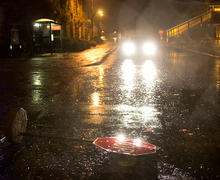Syracuse intercepts 4 Guidugli passes in win
R. Todd Littlejohn had just witnessed a three-interception performance by his secondary. The Syracuse football team allowed a season-low 155 yards passing and seven points. No Cincinnati play went for farther than 42 yards, and the Bearcats failed to score until the fourth quarter.
So what was the secondary coach’s grade of his defensive backfield?
‘Well, I’m tough on them,’ Littlejohn said, a smile creasing across his face. ‘We won. That’s my grade for them. We won and that’s most important. I’ll look at the tape before giving a grade.’
As if it would reveal anything new. Syracuse’s defense played its most complete game – especially among the suspect secondary – as the Orange beat Cincinnati, 19-7, on Saturday before 32,893 at the Carrier Dome.
SU (2-1) intercepted four passes – three by Littlejohn’s secondary unit – the most since it picked off five in 1999 against Tulane.
‘I think we’re getting more consistent play out of our corners,’ head coach Paul Pasqualoni said. ‘We have some first-year starters out there (Tanard Jackson and DeAndre LaCaille), so we’re trying to be supportive and move them along as quickly as possible.’
On Saturday, Syracuse offered the most encouraging look at a unit that has endured two long seasons of humiliation. In 2002, SU allowed a nation’s worst 303.8 passing yards per game. Last year, SU gave up 222 yards a game.
Against Cincinnati, all that was forgotten – for a day, at least. Jackson and safeties Anthony Smith and Diamond Ferri each picked footballs like they were ripe apples off a tree.
Jackson snatched the first one, which came with 4:57 left in the first quarter. The Bearcats drove to within SU’s 18. Cincinnati ran a double-post crossing pattern with its receivers, looking to reach the end zone and go up by seven.
Instead, Jackson recognized the play, cut inside the receiver and caught the ball at SU’s one-yard line, returning it to SU’s five-yard line and saving SU from suffering an early deficit.
‘Tanard is getting better each week,’ Pasqualoni said. ‘He’s a first-year guy, and we’re very pleased with him so far.’
Smith picked SU’s next ball. With 11:33 left in the second quarter, Guidugli overthrew his target, and Smith watched the ball into his mitts. He returned the ball 19 yards to the UC 37-yard line, and a 15-yard facemasking penalty set SU up at the UC 22-yard line. Still, SU failed to score.
Ferri nabbed SU’s third interception with 3:23 left in the second quarter as the Bearcats neared SU territory. Ferri rumbled 43 yards to the UC 25-yard line, leading to a Collin Barber field goal, which put SU up, 10-0.
Although SU’s secondary managed three interceptions, most came on batted balls or unfortunate misfires by Guidugli. Rather than playing exceptional defense, SU may have just benefited from luck – and easy opportunities at turnovers.
But Littlejohn disputes that.
‘There are never easy picks,’ Littlejohn said. ‘You never know when they’ll come. So this was a good job by our guys staying focused and ready.’
Linebacker Kelvin Smith corralled SU’s last interception, which bounced high in the air before landing in Smith’s arms.
But the main attraction of the defense was the secondary.
‘Obviously, we stress turnovers each game,’ Littlejohn said. ‘Any time you can get your hands on the ball, you want to come down with it. We’re excited about the picks. And we want to be among the nation’s best in that category.’
Right now, SU ranks No. 58, with nine turnovers both forced and given up – a turnover margin of zero. The Orange allows 203.7 yards per game passing and ranks 60th, far better than seasons past.
‘The defensive line put good pressure on the quarterback,’ Anthony Smith said, ‘and we just capitalized on the opportunities. We did what we needed to do.’
Published on September 19, 2004 at 12:00 pm





